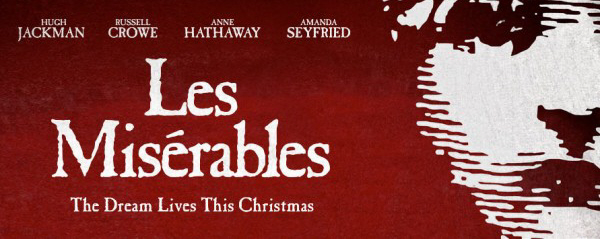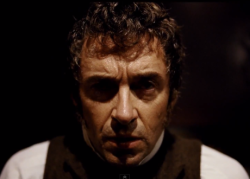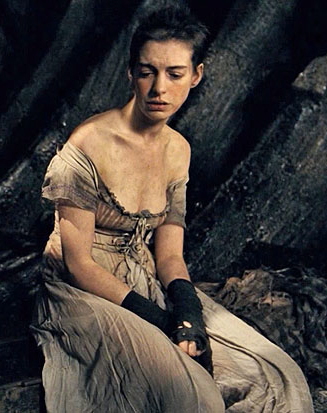
Too many filmmakers go with the safe choices, showing an unwillingness to experiment. Experimentation is important if this artform we love is to thrive. Trouble is, when you test the boundaries the way Tom Hooper does in Les Misérables, it doesn’t always pan out. With his latest effort, the King’s Speech director makes a lot of choices that are unfortunately, really misinformed. Les Misérables spends roughly 140 of its 160 minutes flirting with full-on trainwreck status. And, as experimentation isn’t a substitute for passion, it comes dangerously close to making that flirtation official. A passionless affair with but one or two saving graces; you’d be wise exit the theater when Anne Hathaway’s Fantine does – saving yourself a crushing mess that follows.
 Les Mis isn’t the first musical to forgo actors prerecording their songs and opting to sing live on set. But the reason the method hasn’t been employed since 1975’s At Long Last Love becomes apparent early: it’s terribly inconsistent. It illustrates why a story like Les Mis, with scant dialogue save for the duets, is perfect for the stage; prosceniums by their nature are designed to carry actors’ voices out and into the audiences’ ears. Movie sets aren’t as kind. The actors, with Hooper shoving the camera lens-to-nose every scene, intersperse facial tics in an attempt to enhance the performances and add layer during the songs. Jackman in particular embraces the technique. But his Jean Valjean, the paroled Frenchmen on the run from the law, sounds different with every changing set-piece, eliminating any sort of consistency between the film’s three very distinct acts.
Les Mis isn’t the first musical to forgo actors prerecording their songs and opting to sing live on set. But the reason the method hasn’t been employed since 1975’s At Long Last Love becomes apparent early: it’s terribly inconsistent. It illustrates why a story like Les Mis, with scant dialogue save for the duets, is perfect for the stage; prosceniums by their nature are designed to carry actors’ voices out and into the audiences’ ears. Movie sets aren’t as kind. The actors, with Hooper shoving the camera lens-to-nose every scene, intersperse facial tics in an attempt to enhance the performances and add layer during the songs. Jackman in particular embraces the technique. But his Jean Valjean, the paroled Frenchmen on the run from the law, sounds different with every changing set-piece, eliminating any sort of consistency between the film’s three very distinct acts.
The logic behind the method is misguided. If you’re attempting to replicate the authenticity of theatre, shouldn’t there be an orchestra pit on set at all times, accompanying the singing? Why is one artifice accepted and not the other? Because Les Mis is an actor’s piece, of course (and having an orchestra on-set is dumb).
The performers are clearly giving it their all, but theirs is not an across the board success. Jackman’s voice is sufficient if all over the tonal map. Sadly, 30 Odd Foot of Grunt’s frontman Russell Crowe brings a “They Did the Monster Mash” approach to Inspector Javert’s songs – an approach that’s laughable at best and groan-inducing at regular. Crowe brings all the singing prowess of an American Idol castoff gag real, always flat and with an unfortunate, pained look stretched across his face – perhaps acknowledging his own realization that he’s swimming in the deep end of a pool filled with more talented vocalists.

“It was a graveyard smash.”
We could go down the line of who works and who doesn’t, but it’s hard to care in a film this inconsistent. Nobody else is as atrociously unfortunate as Crowe (though Eddie Redmayne dares to try), and actors like Amanda Seyfried and Samantha Banks bring the goods in the final act. But it’s too late by then, as everything post-Anne Hathaway becomes an exhausting exercise in Tom Hooper’s “We couldn’t just shoot Fantine’s scenes and be done with it,” menagerie.
 Hathaway’s performance in Les Misérables is awe-inspiring: a talented performer making good on her potential and exceeding any and all expectations. Her Fantine, in her short time onscreen, is almost a completely separate entity from the inferior work she’s sandwiched into. And yet Hooper’s misguided vision is fully realized (if only briefly) in Hathaway’s stirring I Dreamed a Dream rendition. Perfectly pitched and painstakingly relayed in the tears draining from her gaunt face and emaciated figure, hers is indeed the performance of the year. It’s the pinnacle of the film, perhaps the pinnacle of the holiday season, and god damn if it isn’t all downhill from there.
Hathaway’s performance in Les Misérables is awe-inspiring: a talented performer making good on her potential and exceeding any and all expectations. Her Fantine, in her short time onscreen, is almost a completely separate entity from the inferior work she’s sandwiched into. And yet Hooper’s misguided vision is fully realized (if only briefly) in Hathaway’s stirring I Dreamed a Dream rendition. Perfectly pitched and painstakingly relayed in the tears draining from her gaunt face and emaciated figure, hers is indeed the performance of the year. It’s the pinnacle of the film, perhaps the pinnacle of the holiday season, and god damn if it isn’t all downhill from there.
Hooper and cinematographer Danny Cohen (who was able to squeeze Johnny English Reborn between King’s Speech and this), have shot one of the ugliest, most visually un-engaging films I’ve seen all year. Every. Single. Musical number is a close-up of an actor’s face, suggesting a refusal to meet the source material on appropriate terms. You have gorgeous sets, beautiful locations; interact with them more. I was astounded how little work wentinto differentiating scene-to-scene – it’s all faces with cameras shoved into them. Not wanting to go to the well too many times, the filmmakers opted to build a cottage so they can just live there now.
I should note that I watched the film with a fan of the play, who acknowledged some of the problems I expressed while still enjoying the overall production. So perhaps mileage varies depending on your affinity to the source material. But it’s hard to offer leniency to a film so riddled with problems. I can appreciate Hooper’s ambition and sit in awe of Hathaway’s ability, but good intentions and the standout performance of the year still aren’t enough to save Les Misérables from being les terribles.
Rating: 




Out of a Possible 5 Stars